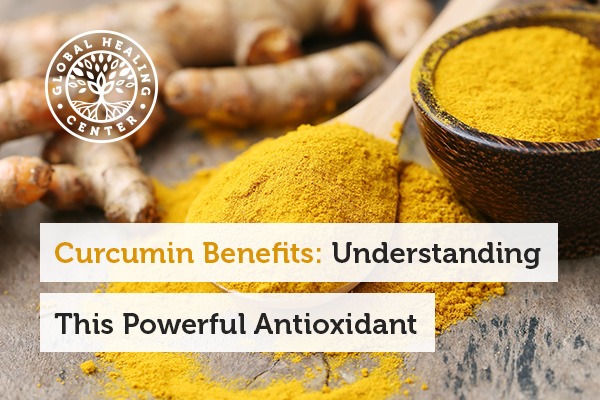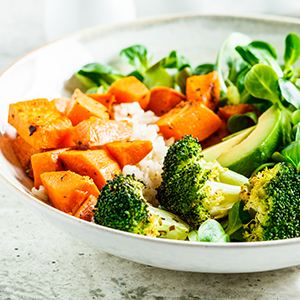
Curcumin is the primary active ingredient in turmeric. Turmeric is a yellow-orange spice that's well-known as a prominent ingredient in Indian cuisine, but it also offers potent therapeutic benefits. Curcumin is the pigment responsible for turmeric's brilliant golden color and many of its health benefits. Curcumin is a potent antioxidant that soothes irritated tissue, supports wound healing, resists harmful organisms, and helps maintain the gastrointestinal, cardiovascular, and immune systems.[1]
The Potent Antioxidant Activity of Curcumin
Oxidative stress is the result of an imbalance between the body's production of harmful free radicals and its ability to counteract them. Antioxidants help restore this balance and assist your body's natural healing mechanisms in repairing the damage.
Turmeric contains many antioxidant compounds, of which curcumin is the most potent. Research shows that the antioxidant activities of this compound are ten times more effective than resveratrol, the antioxidant in red wine.
This compound scavenges free radicals and protects DNA from oxidative damage. Interestingly, not only is curcumin a strong antioxidant, but it also appears to enhance the strength of other antioxidants.[1]
Promotes Cardiovascular Health
The antioxidant properties of turmeric have a direct effect on the cardiovascular system. Curcumin reduces the toxic effects of aggressive medical therapies, especially those that affect the heart.[2] Studies show that curcumin promotes normal heart size and function.[2]
Helps Maintain Liver Health
For centuries, traditional Hindu medicine has used turmeric to support liver health. Now, modern studies affirm that curcumin helps to protect the liver from toxins and promotes normal liver function.[3] Some research even suggests that it can be a beneficial nutrient for persons with fatty liver disease.[4]
Resists Harmful Organisms
Research has found that curcumin is resistant to many types of harmful organisms, especially fungus.[1, 5] Turmeric extracts have even been observed to inhibit the growth of harmful organisms that specifically target the digestive system.[1]
Other Health Benefits
In addition to being a powerful antioxidant and defender against harmful organisms, turmeric is a legit superfood that offers an array of benefits.
Soothes Irritation
Curcumin has soothing properties, and it's one of the most effective ways to support the body's response to inflammation. Multiple studies have determined that daily ingestion of turmeric reduces tenderness, swelling, and stiffness.[1]
Cancer
Scientists have researched turmeric's relationship with several types of cancers, including prostate, breast, skin, and colon cancer, and report that it offers impressive nutritional benefits.[6]
Wound Healing
Curcumin encourages wound repair and normal skin cell production. The effect seems to be effective regardless of whether the curcumin is taken orally or applied directly to the wound.[1]
Gastrointestinal Health
Turmeric is amazing at supporting digestive health, including normal gallbladder function and bile flow. Research shows that turmeric supports the health of stomach cells.[1]
Bioavailability of Curcumin
While curcumin may seem like a miracle nutrient, it does have one weakness — bioavailability. When consumed by itself, our bodies absorb a relatively small amount of it. In response, a lot of attention has been devoted to improving its bioavailability.
One interesting solution is nanocurcumin — a specialized form of curcumin in which tiny particles of the compound are suspended in a special emulsion. The smaller size might make them easier to absorb.[7, 8]
A simpler way of increasing the bioavailability of curcumin is to simply combine it with black pepper. Black pepper contains an alkaloid called piperine, and taking it with turmeric can increase the bioavailability of curcumin up to 2000 percent![9]
Tips for Growing Turmeric
Growing turmeric is easy, but it takes about a year to harvest. Unless you're in a tropical climate, you'll have to grow it indoors. Turmeric doesn't propagate by seeds. Instead, Look for fresh turmeric root at a local nursery (non-organic grocery store varieties may be treated with growth-inhibiting chemicals) and plant a cutting.
A large root will likely have several nodes attached to it, cut them apart — each one will start a new plant. Give each its own container, or plant them 12 to 16 inches apart in your garden; bury each under two inches of loose soil.
Turmeric prefers well-drained soil and full sun. You should see sprouts three to six weeks after planting. Your turmeric root should be ready for harvest after eight to ten months. Start a new plant each year — you can save rhizomes for next year's crop.
Supplementing With Curcumin
Eating fresh turmeric is a great way for your body to reap the spice's benefits. If adding fresh turmeric to your menu every day proves impractical or monotonous, then your next best option is a high-quality supplement. Avoid low-cost, low-quality turmeric supplements as many been recalled for lead contamination.[10]
Global Healing offers a Turmeric Raw Herbal Extract™ and we're exceptionally proud of it. We use the highest quality organic turmeric suspended in a safe and gentle vegetable glycerin base. There's no alcohol, fillers, or unwanted additives. The feedback we've received is incredible.
References (10)
- Braun L, Cohen M. Herbs and Natural Supplements: An Evidence-Based Guide: Volume 2. Australia, Churchill Livingstone, 21 Nov. 2014. Print.
- Wongcharoen W, Phrommintikul A. The Protective Role of Curcumin in Cardiovascular Diseases. International Journal of Cardiology. 2009 Feb;133(2):145-151.
- Rivera-Espinoza Y, Muriel P. Pharmacological Actions of Curcumin in Liver Diseases or Damage. Liver International. 2009 Nov;29(10):1457-1466.
- Kuo JJ, et al. Positive Effect of Curcumin on Inflammation and Mitochondrial Dysfunction in Obese Mice with Liver Steatosis. International Journal of Molecular Medicine. 2012 July;30(3):673-679.
- Wang Y, et al. Study on the Antibiotic Activity of Microcapsule Curcumin Against Foodborne Pathogens. International Journal of Food Microbiology. 2009 Sept;136(1):71-74.
- Turmeric. National Center for Complementary and Integrative Health, National Institutes of Health. Sep 2016. Accessed 4 Apr. 2019.
- Jaiswal M, et al. Nanoemulsion: An Advanced Mode of Drug Delivery System. 3 Biotech. 2015 Apr;5(2):123-127.
- Bhawana, et al. Curcumin Nanoparticles: Preparation, Characterization, and Antimicrobial Study. Journal of Agricultural and Food Chemistry. 2011 Feb;59(5):2056-2061.
- Shoba G, et al. Influence of Piperine on the Pharmacokinetics of Curcumin in Animals and Human Volunteers. Planta Medica. 1998 June;64(4):353-356.
- Six Brands of Turmeric Added to Recall for Excessive Lead. Food Safety News, Marler Clark, 8 Aug. 2016.
†Results may vary. Information and statements made are for education purposes and are not intended to replace the advice of your doctor. If you have a severe medical condition or health concern, see your physician.







